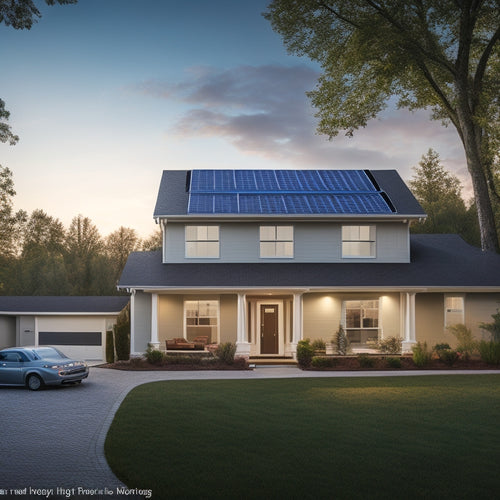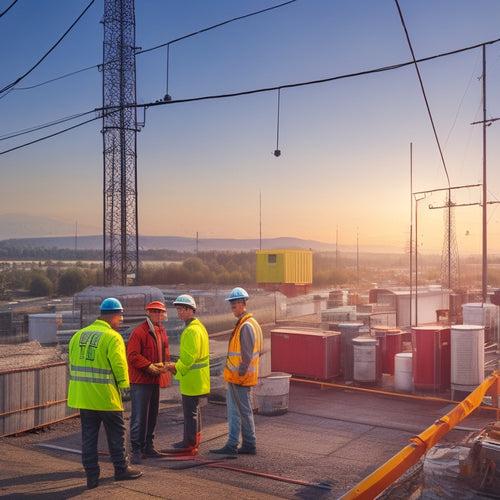
Small House Energy Independence Installation Costs
Share
You're likely wondering what it'll cost to achieve energy independence for your small house. On average, installation prices range from $15,000 to $20,000, depending on system size, quality, and installation company. Solar panel costs are influenced by panel efficiency, and government incentives like the 26% Solar Investment Tax Credit can help offset upfront costs. Additionally, factors like equipment quality, installation labor, and financing options impact the total cost. Understanding these details is vital to making an informed decision - and there's more to investigate when it comes to balancing your budget with your energy goals.
Overview
- The average installation cost for small houses ranges from $15,000 to $20,000, depending on system size, quality, and installation company.
- Solar panel costs are influenced by panel efficiency, with higher efficiency panels being more expensive, but government incentives can help offset upfront costs.
- Financing options and tax incentives, such as the Solar Investment Tax Credit (ITC), can make solar energy more affordable, with a 26% tax credit on total system cost.
- The cost of solar battery storage systems, which range from $5,000 to $15,000+, should be factored into overall expenses, depending on type and quality.
- Equipment quality, including inverter efficiency, and installation company expertise can impact total cost, with permits, inspections, and interconnection fees adding to the total expense.
Understanding Solar Panel Costs
With the cost of traditional energy sources skyrocketing, you're likely considering solar panels as a viable alternative for powering your small house. You're smart to do so, as solar panel efficiency has increased markedly over the years, making them a more viable option.
The cost of solar panels is largely dependent on their efficiency, with higher-efficiency panels being more expensive. However, government incentives can help offset the upfront cost.
Additionally, solar battery storage systems can range from $5,000 to $15,000 or more, influenced by battery type and quality, which can further enhance your energy independence.
The Solar Investment Tax Credit (ITC) allows you to claim a tax credit of 26% of the total cost of your solar panel system. Additionally, many states offer rebates and tax credits, further reducing the cost.
Average Installation Prices Today
As you weigh the benefits of solar energy, you're likely wondering what the average installation prices are today. Currently, the average cost of installing solar panels on a small house is around $15,000 to $20,000. However, this price can vary depending on the system size, quality, and installation company.
The type and quality of equipment, such as high-efficiency inverters inverter efficiency and reliability, also play a significant role in determining the overall cost. In addition, installation and labor costs, including the experience of the workforce, can impact the final price.
Fortunately, financing options and tax incentives can help offset the upfront cost. The federal government offers a 26% tax credit for solar installations, and many states provide additional incentives.
With financing options like loans or power purchase agreements, you can spread the cost over several years, making solar energy more accessible and affordable. By taking advantage of these incentives, you can achieve energy independence without breaking the bank.
Factors Affecting Total Cost
Several variables contribute to the overall cost of a solar energy system, and understanding these factors is essential in determining the total expense of achieving energy independence for your small house.
You'll need to assess the cost of the equipment, installation, and labor, as well as the size and complexity of your system. Additionally, financing options can impact your upfront costs, and you may need to factor in maintenance expenses over the system's lifespan.
Permits, inspections, and interconnection fees can also add to your overall cost. The balance of system (BOS) components account for 30% to 40% of total system expenditure, which includes charge controllers, inverters, and mounting hardware, all of which are essential for system efficiency and durability.
Moreover, factors like your location, roof size, and energy usage will influence the system's design and cost. By understanding these factors, you can make informed decisions about your energy independence installation and guarantee a successful shift to renewable energy.
Cost Breakdown by Component
Clarity emerges when you dissect the total cost of a solar energy system into its constituent parts. You'll find that the cost is divided among several components, each playing a vital role in achieving energy independence.
The solar panels themselves account for approximately 50% of the total cost, with the installation materials, such as mounting hardware and wiring, making up another 20%. The inverter, responsible for converting DC power to AC, adds around 15% to the overall cost.
Balance of system components, including monitoring and tracking systems, make up the remaining 15%. When evaluating quotes, it's important to evaluate the component efficiency of each system, as this can greatly impact the overall performance and cost-effectiveness of your solar energy system.
Comparing Quotes and Providers
Your energy independence project's success hinges on traversing the complex terrain of quotes and providers.
You'll receive quotes from multiple providers, each with varying degrees of skill, equipment, and pricing. It's essential to compare these quotes carefully, considering factors beyond the initial cost.
Assess the provider's reputation by researching online reviews, asking for referrals, and verifying certifications. Quote negotiation is also key; don't be afraid to ask about potential discounts or flexibility in the pricing structure.
Create a spreadsheet to organize the quotes, breaking down costs by component, and evaluate the overall value each provider offers.
Frequently Asked Questions
Can I Install Solar Panels on My Own to Save Money?
You can attempt a DIY solar installation, but be prepared to tackle complex electrical and mechanical challenges, ensuring you've got the necessary skills and permits, or you'll risk voiding warranties and compromising your system's performance.
Are There Any Government Incentives for Energy Independence?
You can tap into government incentives for energy independence by leveraging energy tax credits, which offset installation costs, and exploring renewable energy programs, like the Residential Renewable Energy Tax Credit, to maximize your savings.
How Long Does a Typical Solar Panel Installation Take?
You'll typically spend 2-5 days on a solar panel installation, depending on the type and complexity of the system, with the installation process involving site assessment, permit acquisition, and actual panel mounting and connection.
Can I Finance My Energy Independence Installation Through a Loan?
It just so happens that you're not alone in seeking energy independence! You can finance your installation through a loan, exploring loan options that offer financing benefits like low interest rates and flexible repayment terms, giving you freedom from utility bills.
Will My Home's Value Increase With an Energy Independence Installation?
You'll likely see an increase in your home value with an energy independence installation, as it increases your property's appeal and reduces reliance on external energy sources, making your home more attractive to potential buyers.
Ready to Buy
As you stand in front of your small house, envision a future where the sun's warm rays not only brighten your days but also power your life. With solar energy independence, you can break free from the grid's grasp. While the installation costs may seem intimidating, understanding the components and factors involved can help you make an informed decision. Now, imagine flipping the switch, and your home comes alive, powered by clean, renewable energy - a guiding light of sustainability, shining brightly for years to come.
Related Posts
-

Top Portable Refrigerators for Camping Adventures
When you're camping, having a reliable portable refrigerator can make all the difference for keeping your food fresh ...
-

Cost of Solar With Battery Backup
You're investing in a solar panel system with battery backup to guarantee reliable power during outages. The cost of ...
-

Smart Grid Technology Implementation Challenges
You'll encounter several challenges when implementing smart grid technology, particularly in cost management, scalabi...


